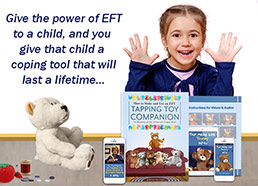 Use the “Law of Opposites
Use the “Law of Opposites
It is all too easy to shortchange ourselves in our EFT choices. That is, to make Choices that are less than optimal and not really what we want.
Suppose, for example, you have an unsatisfactory relationship with a friend who is important to you. An EFT statement that went, “Even though (person’s name) and I have trouble relating, I choose to ___________,” will require that you fill in an effective EFT Choice for the second part of your statement. An excellent way to do that is to use the Law of Opposites.
With this method you need to describe in as vivid detail as possible the exact opposite of what is happening now. For example, the opposite of not having a good relationship with your friend might be to have a “good relationship” with your friend. The only problem with this wording is that “good” is a vague concept, or otherwise, “global” in nature. When we give instructions to our subconscious using EFT Choices, we are asking for a result, and if the result we ask for is too vague and general, the result we want will be hard to realize.
We might compare this to what would happen in a company if a supervisor said to someone working under them, “I want you to write a ‘good report’. The worker might put in a little more effort in the task if they felt they should write a “good report”, but they wouldn’t know just what to do. However, if the supervisor said instead, “I want a report that is no more than three pages long, summarizes the main reasons why we have developed this new division of the company, and describes how we hope to expand it in the future”, this would be an effective directive.
We can consider our subconscious (that part of our brain which is non-conscious) to be but a tiny island within the vast bio-computer that is our brain. Therefore, to go back to the illustration of yourself wanting to have a better relationship with your friend, let’s look at ways that this can be stated in a more specific manner. One of the fastest and most effective shortcuts I know for doing this is to choose a role model or a specific example from your own life, and make an EFT Choice based on it.
Suppose you have an excellent relationship with another friend. There will be many to differences in each friendship according to the characteristics of the person and the context in which you two are relating. Is the relationship that of a relative, lover, business associate, childhood chum or some other? Whichever category it falls into, this determines what a “good” relationship means in this instance. One useful rule of thumb is to determine the context of the friendship and then to search for someone else who also falls within this same context and is a person with whom you have a friendship that is extremely satisfactory to you.
Then try to find as many parallels as possible in your mind between the really good relationship you’d like to use as a model, and the one that is unsatisfactory now. The more closely they approximate each other, the more effective this particular method is going to be. Let’s suppose that the first friend (with whom you are having difficulty) is a neighbor whom you see or talk to fairly often. Now imagine that you can think of another neighbor whom you see or talk to fairly often, with whom you have an extremely pleasant relationship.
Let’s say that the name of the friend with whom you have a very pleasant relationship is “Karen,” and the friend who is a problem to you is named “Andrea”. You could make a very effective EFT Choice by saying “Even though I am having trouble in my relationship with Andrea, I choose to handle my relationship with her as comfortably as I do my relationship with Karen”.
Notice that this Choice does not suggest that you make your relationship with Andrea different, that would involve changing another person’s behavior and we cannot make meaningful Choices for others. However, we can always choose our own reactions to any situation, and having a good role model for how you would like the situation to go is a highly effective way of doing this.
This suggestion need not apply only to your relationships with people, by the way. Suppose you are having a great deal of difficulty handling certain features of your current computer, and that you feel baffled and frustrated by this (does that sound at all familiar?). What can be very effective in this instance is to think of another electronic or mechanical device that you have access to, with which you feel very comfortable. This easy device would then become your role model and feature in your Choices Statement. You might say, for example, “Even though I don’t know how to handle Outlook properly so that it brings up the correct addresses, I choose to handle it the way I did when I figured out how to(fill in a situation in which you solved a problem on your own computer to your satisfaction).” By doing this you are giving your subconscious an effective directive, one based on a previous success. There is always a model of success somewhere in your stored memories, and here you are calling upon it.
Making EFT Choices in this manner is very effective. I suggest that you call upon stored memories of your own successful relationships with people, or even animals, in the past; a method known as using personal Resource States. Do this often when making EFT choices. You will see some surprising things happen. The brain can sort for similarities very quickly, it’s set up to do that, and these similarities can be strongly in your favor when using EFT Choices.






